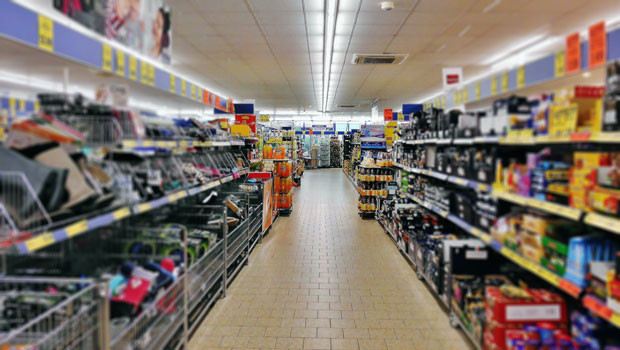Grocery inflation hits 10-year high

UK shoppers are increasingly turning to cheaper own brand products, industry data showed on Tuesday, as grocery inflation rose to a near decade high.
Food & Drug Retailers
4,456.83
12:54 24/12/24
FTSE 100
8,136.99
12:59 24/12/24
FTSE 350
4,491.87
12:54 24/12/24
FTSE All-Share
4,449.61
13:14 24/12/24
Ocado Group
312.70p
12:35 24/12/24
Sainsbury (J)
272.00p
12:40 24/12/24
Tesco
368.50p
12:40 24/12/24
According to the latest research from retail consultancy Kantar, grocery price inflation was 5.2% in the four weeks to 20 March, the highest since April 2012. In the 12 weeks to 20 March, it was 4.2%, with prices rising fastest in savoury snacks and pet food, and falling in fresh bacon.
As a result, Kantar found that shoppers were increasingly turning to own-brand products, which now account for 50.6% of all spending.
Fraser McKevitt, head of retail and consumer insight at Kantar, said: "More and more we’re going to see consumers and retailers take action to manage the growing cost of grocery baskets.
"Consumers are increasingly turning to own label products, which are usually cheaper than branded alternatives. Own label sales are down in line with the wider market, but the proportion of spending on them versus brands has grown to 50.6%, up from 49.9% this time last year."
Discounters Aldi and Lidl also benefited as shoppers sought out cheaper groceries. Aldi’s sales jumped 3.6% in the 12 weeks to 20 March year-on-year, pushing its market share to 8.6%, a new high. Lidl maintained its market share at 6.4% after sales also rose 3.6%.
Out of the big four, Tesco saw sales fall 5.2% year-on-year, although its market share nudged higher to 27.4%.
J Sainsbury saw sales fall 7.5%, Asda's sales were down 9.9% and Wm Morrison slid 11.5%. Ocado was down 6.7%.
The declines echoed the wider market, with overall supermarket sales off 6.3% in the 12-week period year-on-year, though they rose 0.7% when compared to the same period in 2020.
Households made 15.4 visits to the supermarket on average last month, compared with 15.6 in March 2021 - the first annual decline for a year.
McKevitt said: "It’s no surprise that sales are down over the latest period as consumers are now more confident eating out of the home again.
"What we’re really starting to see is the switch from the pandemic being the dominant factor driving our shopping behaviour towards the growing impact of inflation, as the cost of living becomes the bigger issue on consumers’ minds."
Victoria Scholar, head of investment at Interactive Investor, said: "The latest Kantar data highlight that as the cost of living bites, price is the most critical factor when it comes to consumer demand, playing into the hands of the German discounters as well as Tesco, while other supermarkets are struggling to keep up.
"Supermarkets are attempting to deal with rising cost pressures without much wiggle room to pass these onto consumers, instead being forced to accept lower margins in order to remain competitive in an intensely price sensitive sector."